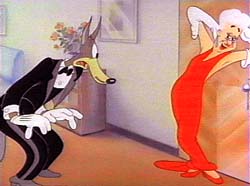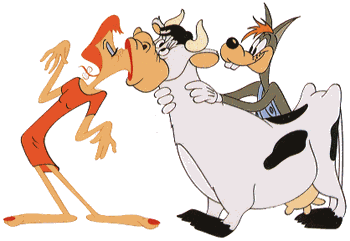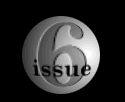|

Granny locks the Wolf in her penthouse
apartment in "Red Hot Riding Hood."
"Little Red Walking Hood" (1937)/"Red Hot Riding Hood" (1943)/"Little Rural Riding Hood" (1937)
"Little Red Walking Hood" is the first of Avery's three formal adaptations of this story. He was apparently so intrigued by something in the story that he even allows it to bleed into "The Bear's Tale," his version of "Goldilocks and the Three Bears." Here he blatantly exploits what is implicit, but often unacknowledged, in the written fairy tale: the idea of the Wolf going to bed with Red. The bare bones of the story are intact, but the characters deviate entirely from the model, ridiculing each other and the story, and generally sending up the solemnity of the proceedings. The Wolf courts Red not because he wants to get Granny's address but because he's hot for Red. But she is one of Avery's unobtainable women; she's bored by the Wolf and shows it by giving him the literal cold shoulder. Granny, like the old women in other Avery fairy tales, is a lush who interrupts the Wolf's attack on her to order "a case of gin" from the local grocer. (She also addresses the audience directly: "Will you people pardon me just a minute?") Even the climax is not safe from Avery's self-reflexive gags; Red and the Wolf stop their fistfight to denounce two patrons getting into their chairs in the theatre where this cartoon is playing. As "cartoon actors," Granny and the Wolf collaborate in continuing the drama: when the Wolf hears Red coming, he panics, and Granny quickly hands him her clothes so he can dress up like her for the next scene.
In the opening sequence of "Red Hot Riding Hood," a simpering narrator says, "Good evening, kiddies! Once upon a time Little Red Riding Hood was skipping through the woods…" But this time the Wolf stops and refuses to continue: "I'm fed up with that sissy stuff … Every Hollywood studio has done it this way!" Taken aback by this sudden revolt, which Granny and Red also join in, the shocked narrator agrees to try a new tack. Thus the terrified little-girl Red is reborn as a red-hot mama who performs at the local nightclub. Her lyrics are unapologetic in demanding material reward for sexual favors: "Hey Daddy … you better get the best for me!" But, as in "Swing Shift Cinderella," Avery surprises by devoting most of the time to the Wolf's frantic attempts to escape the violent attentions of an older woman, Granny, who's now a sex-mad hepcat.

"Red" is no longer a pinup in "Little Rural Riding Hood."
In "Little Rural Riding Hood," the title character reaches the height of stylization; she's now longer a child-image, nor a sexy pinup, but a hybrid: tall, ugly, and angular, with prehensile toes that open and close doors on the Wolf's face. She's also self-possessed and sexually volatile, though her voice sounds suspiciously like Screwy Squirrel's taken down a register. The Wolf's equally rabid; in a sequence that threatened to bring on the censors, he insists he has no plans to eat Red: he wants more fleshly pleasures: "Ah'm gonna chase her and catch her and kiss her and hug her and love her and hug her and love her…" As so often in Avery, both Red and the Wolf speak directly to the audience, not even bothering with the "suspension of disbelief" that's critical to most fictional constructs, literary or cinematic, but whose absence makes Avery even today the most modern of cartoon auteurs.
page 4 of 4
 
Gary Morris is the editor and publisher of Bright Lights Film Journal. He writes regularly for the Bay Area Reporter and SF Weekly. He can be reached at gm@dnai.com.
|


